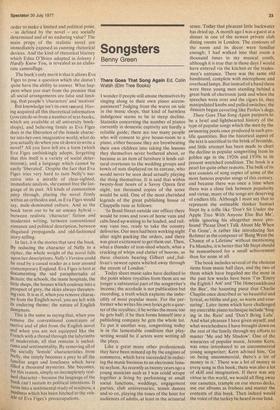Songsters
Benny Green
There Goes That Song Again Ed. Colin Walsh (Elm Tree Books)
I wonder if people still amuse themselves by singing along to their own piano accompaniment? Judging from the wares on sale in the music shops, that kind of harmless indulgence seems to be in steep decline. Statistics concerning the number of pianos currently in domestic captivity are hardly a reliable guide; there are too many people who will consent to give house-room to a piano, either because they are browbeating their own children into taking the lessons they themselves never bothered about, or because as an item of furniture it lends cultural overtones to the wedding groups and bowls of nuts displayed on its carcase, who would never be seen dead actually playing the thins themselves. It is said that within twenty-tour hours of a Savoy Opera first night, ten thousand copies of the score would be sold. One of the most cherished legends of the great publishing house of Chappells runs as follows: 'In Bond Street outside our offices there would be rows and rows of horse vans and cabs lined up waiting to be loaded, and railway vans too, ready to take the country deliveries. Our men had been working night after night cacking the orders, and there was great excitement to get them out. Then, what a thunder of iron-shod wheels, what a cracking of whips and clatter of hooves, as these chariots bearing Gilbert and .,Sullivan's newest opera whirled away through the streets of London.'
Today sheet music *sales have declined to the,point where royalties from them are no longer a substantial part•of the songwriter's income; the accolade is not publication but recording, a truth which explains the imbecility of most popular music. For the performer who writes his own lyrics gets a quarter of the royalties; if he writes the music too he gets half; if he then forms himself into ,tt publishing company he gets the whole lot. To put it another way, songwriting today is in the lamentable condition that playwriting would be if actors were writing all the plays.
Like a great many other professionals they have been minced up by the engines of commerce, which have succeeded in reducing the music business to an electronic lunatic asylum. As recently as twenty years ago a young musician such as I was could scrape together a living by performing at small social functions, weddings, engagement parties, club anniversaries, tennis dances and so on, playing the tunes of the hour for audiences of adults, at least in the actuarial sense. Today that pleasant little backwater has dried up. A month ago I was a guest at a dinner in one of the newest private club dining rooms in London. The contours of the room and its decor were familiar enough; I had walked into that room a thousand times in my musical youth, although it is true that in those days I would have entered via the kitcheu or the tradesmen's entrance. There was the same old bandstand, complete with microphone and overhead lamps. But instead of a band there were three young men standing behind a great bank of electronic junk and when the speeches were over and the cigars lit, they manipulated knobs and pulled switches; the dancers began cavorting like Pavlov's dogs.
There Goes That Song Again purports to be a brief and 'lighthearted history of the type of popular songs which the men by the swimming pools once produced in such prolific quantities. But the historical aspect of the text is uncritical to the brink of bromide, and little attempt has been made to chart the decline in popular songwriting from its golden age in the 1920s and 1930s to its present wretched condition. The book is a pearl for quite other reasons. The bulk of its text consists of song copies of some of the most famous popular songs of this century, and because there was once a time when there was a close link between popularity and virtue, many of the songs are deserving of endless life. Although I must say that to represent the estimable thinker Samuel Stept by a trifle like 'Don't Sit Under the Apple Tree With Anyone Else But Me', while ignoring his altogether more profound 'Please Don't Talk About Me When I'm Gone', is rather like introducing Sax Rohrner as the composer of 'Bang Went the Chance of a Lifetime' without mentioning Fu Manchu, it is better that Mr Stept should be remembered for a small achievement than for none at all.
The book includes several of the choicest items from music hall days, and the two of them which have beguiled me the most in the past few weeks have been 'I'm 'Enery the Eighth I Am' and 'The Honeysuckleand the Bee', the haunting piece that Charlie Chaplin once described as `so beautiful and lyrical, so blithe and gay, so warm and reassuring'. Later items which have challenged my execrable piano technique include 'Singing in the Rain' and 'Don't Bring Lulu'. And what pleasure I have given myself, and what wretchedness I have brought down on the rest of thelamily through my efforts to • master `Me and My Shadow'. One of the wiseacres of popular music, Jerome Kern, was once introduced to an uncommercial young songwriter; Kern advised him, `Go on being uncommercial, there's a lot of money in it.' There was a lot of money in every song in this book; there was also a lot of skill and imagination. If there was any virtue in this world, we would all fling away our cassettes, trample on our stereo decks, use our albums as frisbees and master the contents of this book. Then indeed would the voice of the turkey be heard in our land.


































 Previous page
Previous page